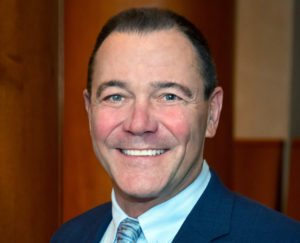Keep the Faith

Michael J. Readinger
Faith is the substance of things hoped for, the evidence of things not seen. — Hebrews 11:1
The principle of trusting that what you cannot see will happen is at the center of having faith. At no period in my lifetime have I ever experienced a greater need for faith — or, for the hope that however we emerge from this pandemic will be something currently unknown and, despite the losses we experience, even better than what we knew before this began. In this time of crisis, uncertainty, fear, anxiety, loss, loneliness, sickness and death, it is more important than ever to remain open to the concept of placing your trust in others. Our medical experts and front-line care staff, our political leaders, our first responders, our co-workers, our families, our friends, our churches, and our God can all be sources of inspiration, support, hope, love, trust and faith.
Nobody knows when this COVID-19 pandemic will run its course or what our health care system, political structure, or economy will look like when it ends. Will we get a brief reprieve only to cycle through it again? Will there be COVID-20, -21, -22 and so on? Will a vaccine or a cure be found? Will there be a new global crisis that follows this one? None of us knows the answer to any of those questions and that is why we need to have faith more than ever!
These questions were not on our minds or in our hearts when we were together in Memphis in early March. They were not even mentioned when we had our generative session at the Thursday luncheon where we explored the Vision 2030 concept. In hindsight, the questions we explored in Memphis actually apply to our lives today and in the months ahead as we emerge from this global crisis. I believe we have a chance to use the current pandemic as a means to advance our generative thoughts about Vision 2030 in an accelerated manner. It was Winston Churchill who first said, “Never let a good crisis go to waste.” Just as the virus has spread exponentially across the world, we should allow our thinking to increase at an exponential rate. Let’s not waste time thinking about what might be in 2030; instead, let’s implement some ideas and strategies that will lead us to the future state immediately. Let’s not just try to “manage” the disruption and react to the change. Let’s commit to lead into the change that we will experience when we enter the era of COVID-19 recovery.
We can start by adapting the questions we answered in Memphis to be more relevant: How will we work and meet in the weeks and months ahead? Perhaps the way we met before can be more universally replaced with the ways we have adapted our meetings and interactions with social distancing as a guideline. Can we have great and meaningful connections even as we are remote from each other? Can we resource our ministry settings in new ways? Can we develop leadership formation from a distance? What advocacy initiatives are most relevant today and will they remain so as the next decade continues? Can we worship virtually? Or, in the absence of meeting face to face during this time, will we truly recognize there is no replacement for the gift of gathering in the same physical space to work and grow as leaders, advocate, and worship?
Almost all of the CHHSM Annual Gathering attendees weighed in on the questions we raised in Memphis at that Thursday lunch. A large number agreed to serve on a task force in the months ahead that would further refine and develop the ideas we collected that day. The COVID-19 virus pandemic has now called on us to transform that process. Can we really afford to wait until 2030? The time to vision is now.
Join Our Mailing LIst
Follow on Facebook
Iredell Adult Day Services Hosts Ribbon-Cutting to Celebrate Adult Day Health Certification - CHHSM
www.chhsm.org
Iredell Adult Day Services (IADS) in Newton, N.C. — a nonprofit organization dedicated to caring for older adults, vulnerable groups, and their families, and part of EveryAge — hosted a ribbon cut...